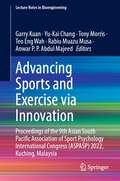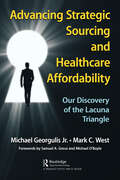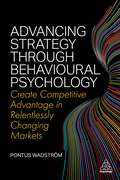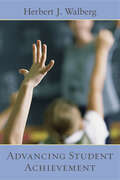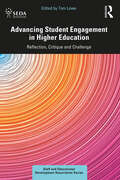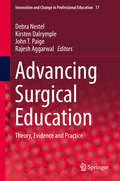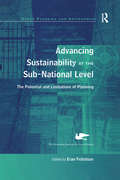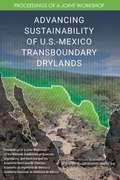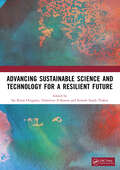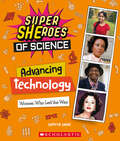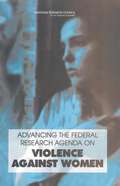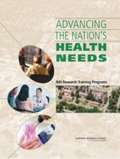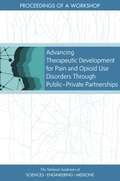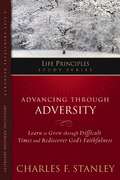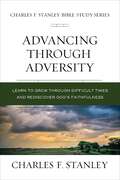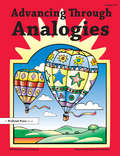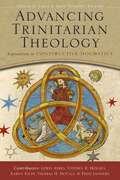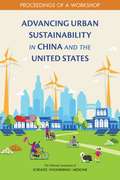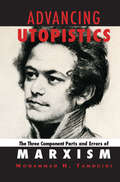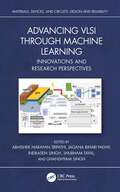- Table View
- List View
Advancing Sports and Exercise via Innovation: Proceedings of the 9th Asian South Pacific Association of Sport Psychology International Congress (ASPASP) 2022, Kuching, Malaysia (Lecture Notes in Bioengineering)
by Tony Morris Rabiu Muazu Musa Anwar P. P. Abdul Majeed Garry Kuan Yu-Kai Chang Teo Eng WahThis book presents the proceedings of the 9th Asian South Pacific Association of Sport Psychology International Congress (ASPASP) 2022, Kuching, Malaysia, which entails the different sporting innovation themes, namely, Applied Sport and Social Psychology, Health and Exercise, Motor Control and Learning, Counselling and Clinical Psychology, Biomechanics, Data Mining and Machine Learning in Sports amongst others. It presents the state-of-the-art technological advancements towards the aforesaid themes and provides a platform to shape the future direction of sport science, specifically in the field sports and exercise psychology.
Advancing Strategic Science: A Spatial Data Infrastructure Roadmap for the U.S. Geological Survey
by Committee on Spatial Data Enabling USG Strategic Science in the 21st CenturyScience is increasingly driven by data, and spatial data underpin the science directions laid out in the 2007 U. S. Geological Survey (USGS) Science Strategy. A robust framework of spatial data, metadata, tools, and a user community that is interactively connected to use spatial data in an efficient and flexible way--known as a spatial data infrastructure (SDI)--must be available for scientists and managers to find, use, and share spatial data both within and beyond the USGS. Over the last decade, the USGS has conducted breakthrough research that has overcome some of the challenges associated with implementing a large SDI. Advancing Strategic Science: A Spatial Data Infrastructure Roadmap for the U. S. Geological Survey is intended to ground those efforts by providing a practical roadmap to full implementation of an SDI to enable the USGS to conduct strategic science.
Advancing Strategic Sourcing and Healthcare Affordability: Our Discovery of the Lacuna Triangle
by Mark C. West Michael Georgulis, Jr.The United States spends more than 17% of its gross domestic product (GDP) on health care, while other developed countries throughout the world average 8.7% of GDP on healthcare expenditures. By 2028, that percentage in the United States is projected to be 19.7% of GDP. Yet all this spending apparently doesn’t equate to value, quality, or performance. Among 11 high-income countries, the U.S. healthcare industry ranked last during the past seven years in four key performance categories: administrative efficiency, access to care, equity, and healthcare outcomes. This book centers on ways to bring down skyrocketing healthcare costs and improve comparatively low patient outcomes by focusing on the second-highest cost after staffing in U.S. healthcare: the supply chain. The authors present strategies for aligning the healthcare supply chain, leadership, physicians, and department budget owners to achieve evidence-based value analysis (EVA) and effective strategic sourcing. The key to bringing alignment to where it needs to be is understanding the art and science of EVA and strategic sourcing and reorienting the health systems toward productively and gainfully accomplishing them both. Within healthcare, the biggest opportunities for a quantum leap in affordability and quality directly tie to improving the product and service selection process through EVA and greatly advancing hospital and health system supply chain sourcing strategies. The book outlines what the authors call the Lacuna Triangle—three lacunas (or gaps) that occur in hospitals and health systems that prevent them from pursuing effective EVA and strategic sourcing. The authors explore the three effects of those gaps, which keep the Lacuna Triangle walls tightly closed so that the oligopolies, irrational markets, and irrational pricing that those gaps create can continue to thrive, and where many healthcare organizations remain trapped. The goal with this book is to pluck the supply chain and health system executive and clinical leadership out of the chaos and irrationality they are caught in and give them tactics and strategies for reengineering the alignment of these processes to serve their enterprises’ needs. The book does this by a deep exploration into strategic sourcing, a way of doing business that has been embraced and employed effectively for decades in supply chain management in various industries and in healthcare supply chain in other countries.
Advancing Strategy through Behavioural Psychology: Create Competitive Advantage in Relentlessly Changing Markets
by Pontus WadströmAccelerate strategy and achieve desired results with this guide to understanding and influencing employee behaviour, based on the theory and practice of strategic management, behavioural psychology and change.The realisation of strategy is entirely dependent on employee behaviour, so in order to achieve business results it is vital that managers and leaders develop an understanding of human behaviour. Advancing Strategy through Behavioural Psychology shows that by identifying which behaviours should be measured and encouraged, organizations can succeed in implementing strategies for continuous adaptation in a rapidly changing business environment.Grounded in practitioner experience and academic research, this book argues that to achieve set goals organizations should spend less time planning and sending out instructions and more time on providing feedback on implementation and drawing out key points to be learned. By focusing on behaviour in this way, organizations can create a culture where innovation is encouraged and employees want to contribute to the company's future. Ensure long-term success and seize competitive advantage with this essential guide to identifying the key behaviours which will create business results and what influences them.
Advancing Student Achievement
by Herbert J. WalbergA renowned educator-psychologist explains how children learn and how family, classroom, and school practices can help them learn more effectively. In addition to drawing on studies of learning outcomes, the author reveals economic research on teacher education and school choice that challenges many popular assumptions.
Advancing Student Engagement in Higher Education: Reflection, Critique and Challenge (SEDA Series)
by Tom LoweProviding a selection of critical pieces on the key challenges and debates in student engagement in higher education, this edited collection of sector-leading, scholarly-informed critical reflections is designed to consider and build upon what can be done to advance student engagement. By problematising student engagement practice, this book explores how to strengthen policies, recognise the issues and create solutions to overcome barriers and tensions. It considers topics such as diversity, accessibility, representativeness, evidencing impact, data analytics, the campus estate and the impact of COVID-19. The contributors provide lessons learned and knowledge from the field to make practice with students more considered and robust for the challenges ahead in the post-pandemic university. Moving beyond endorsing student engagement and offering best practice to critically reflect on and challenge our engagements with students in contemporary higher education, this book is ideal reading for all those developing education, course leaders and heads of academic departments, as well as anyone interested in advancing student engagement in their higher education setting.
Advancing Surgical Education: Theory, Evidence and Practice (Innovation and Change in Professional Education #17)
by Debra Nestel Kirsten Dalrymple John T. Paige Rajesh AggarwalThis book is designed for anyone involved in surgical education. While it is intended as a core reference for surgeons who want to develop their surgical education knowledge and practice, it also a valuable resource for anyone undertaking a higher degree in health professions education. Divided into five parts, it starts with chapters on foundational knowledge, exploring the past before documenting the current state of surgical education and highlighting various educational leadership and governance topics. The second part examines a range of theories that inform surgical education – cognitive, behavioural and social, while the third part offers practical guidance on elements of surgical education – curriculum design, selection, feedback, assessment, evaluation, simulation and managing trainee underperformance. It also includes chapters on supporting the development of psychomotor skills, operative skills in theatre, professionalism, teamwork and patient safety. The next part shifts the focus to research in surgical education, introducing readers to all phases of conducting education research based on qualitative, quantitative and mixed methods paradigms. The final part looks to the future of surgical education and of surgical educators. Assembling these topics in one volume makes this book invaluable to anyone involved in surgical education.
Advancing Sustainability at the Sub-National Level: The Potential and Limitations of Planning (Urban Planning and Environment)
by Eran FeitelsonSustainability notions have been widely embraced by planners. However, the question of what can planners contribute to the advancement of such notions has not received much attention until now. This volume examines the potential contribution of planning to the advancement of sustainability at sub-national level, and the limitations it faces in doing so. Bringing together case studies from the US, UK, Poland, Israel, South Africa, The Netherlands and Italy, it covers a wide range of issues and contexts, ranging from the metropolitan to the community level. On the basis of these case studies, the book shows that planners do indeed have a variety of options to advance sustainability notions at these levels, and appear to be doing so. The book proposes that planners should operate at two levels: firstly to change institutional structures, and secondly to advance sustainability notions incrementally in the meantime, within the existing institutional constraints.
Advancing Sustainability of U.S.-Mexico Transboundary Drylands: Proceedings Of A Workshop
by Engineering Medicine National Academies of SciencesThe drylands region shared by the United States and Mexico currently faces multiple sustainability challenges at the intersection of the human and natural systems. Warming and drying conditions threaten surface water and groundwater availability, disrupt land- and marine-based livelihood systems, and challenge the sustainability of human settlements. These biophysical challenges are exacerbated by a highly mobile and dynamic population, volatile economic and policy conditions, increased exposure to extreme events, and urbanization on marginal, vulnerable lands. The U.S. National Academies of Sciences, Engineering, and Medicine collaborated with the Mexican Academy of Sciences, Academy of Engineering, and the National Academy of Medicine to plan a 2-day binational workshop, Advancing Sustainability of U.S.-Mexico Transboundary Drylands. The workshop goals were to highlight the challenges facing the region, assess the scientific and technical capacity that each nation can bring to bear in addressing these challenges, and identify new opportunities for binational research collaboration and coordinated management approaches in the advancement of sustainability science and development. This publication summarizes the presentations and discussions from the workshop.
Advancing Sustainable Science and Technology for a Resilient Future
by Dimitrios A Karras Sai Kiran Oruganti Srinesh Singh ThakurThe Industrial Internet of Things (IIoT) has become an effective tool with significant implications for industrialisation and Market Research (MR), especially in the field of green production. Green IIoT (GRIIoT) can be used to implement Green Production (GP) goals for the environment. The purpose of this study is to examine the drivers behind the adoption of GIIoT, MR, and industrialization decision-making, as well as the effects these drivers have on industrialization performance (IP). A structured questionnaire was used to gather information in order to evaluate the suggested study paradigm. The results indicate that institutional isomorphism influences the acceptance of GRIIoT in a favorable way. Furthermore, Green innovation (GI) activities that result in IP are favorably correlated with GIIoT. The potential effects of the various institutional isomorphisms discussed in this study can aid organizations in better understanding the responsibilities to protect and satisfying stakeholders, particularly as the adopt GIIoT to handle production problems and possible accordance pressures in the process.
Advancing Technology: Women Who Led the Way (Super SHEroes of Science) (Super SHEroes of Science)
by Supriya SahaiThis brand-new series highlights some of the major contributions women have made in the world of science.Did you know that the technology behind cell phones was based on an idea developed during World War II by the Hollywood star Heddy Lamar to prevent the enemy intercepting radio messages? The computer and other electronic devices have changed life dramatically over the last 70 years—and many of the key breakthroughs in technology were made by women. These women’s achievements were often highly specialized and have been widely overlooked. This book tells their stories and describes their vital contributions.
Advancing The Federal Research Agenda On Violence Against Women
by Steering Committee for the Workshop on Issues in Research on Violence Against WomenThis report expands on the work of an earlier National Research Council panel whose report, Understanding Violence Against Women, was published in 1996. The report is based on the presentations and deliberations of a workshop convened in January 2002, at the request of Congress, to develop a detailed research agenda on violence against women. While some of the research recommendations in the earlier report have been funded and carried out, the workshop demonstrated that important gaps remain. For example, prevalence and incidence data are still inadequate to measure trends or to reveal whether interventions being designed under federal programs are, in fact, working. Among its primary recommendations, the committee underscored the importance of strengthening the data and research infrastructure in this area, especially the need for better prevalence data and longitudinal data to determine the causes of violent victimization of women and the impact of interventions.
Advancing The Nation's Health Needs
by Committee for Monitoring the Nation's Changing Needs for Biomedical Behavioral Clinical PersonnelThe National Institutes of Health’s role in supporting research has long been recognized as a major factor in advancing the health needs in the nation and the world. The National Research Council was charged with the responsibility of periodically assessing the National Institutes of Health’s National Research Service Awards program, thus this book is the twelfth edition in the series. While the National Research Service Awards program now supports only a fraction of the training in the biomedical, clinical, behavioral, and social sciences, it sets a high standard for the training in all doctoral programs in these fields. Also included are the training needs of oral health, nursing, and health services research. This book has been broadly constructed to take into account the rapidly evolving national and international health care needs. The past and present are analyzed and predictions with regard to future needs are presented.
Advancing Therapeutic Development for Pain and Opioid Use Disorders Through Public-Private Partnerships: Proceedings Of A Workshop
by Engineering Medicine National Academies of SciencesChronic pain is one of the most prevalent, costly, and disabling health conditions in the United States. Estimates show that more than 11 percent of the American population suffer from chronic pain, yet the federal pain research investment has been minimal. In parallel with a gradual increased recognition of the problems of treating chronic pain, the opioid epidemic has emerged as a growing public health emergency. The intersection of these two crises lies in the fact that an unintended consequence of treating pain has been an increasing number of opioid prescriptions and diversion of drugs for illicit purposes. In May 2017, the National Institutes of Health (NIH), and the National Institute on Drug Abuse announced a public–private partnership to develop solutions to the opioid crisis and cut in half the time it takes to develop non-addictive analgesics. To advance the planning of NIH’s anticipated public–private partnerships, the National Academies’ Forum on Neuroscience and Nervous Systems Disorders hosted a public workshop that brought together a diverse group of stakeholders from academia, federal agencies, advocacy organizations and companies developing therapeutics for pain and opioid use disorders. Participants discussed potential strategies to accelerate development of non-addictive pain medications and treatments for opioid use disorders. This publication summarizes the presentations and discussions from the workshop.
Advancing Through Adversity: Advancing Through Adversity (Charles F. Stanley Bible Study Ser.)
by Charles F. StanleyGod has a plan and a purpose for you, and He can turn things to good regardless of the situation you face. These two key principles, rooted in Scripture and evidenced in the lives of Christians throughout the ages, must color the lenses through which you view adversity. In Advancing Through Adversity, Charles Stanley provides a new perspective on adversity. You'll learn which questions to ask and what lessons can be learned from adversity. Understanding God's role and bolstering your courage can help you advance through adversity rather than be overcome by it. The Life Principles Study Guides are perfect companions to Dr. Stanley's Life Principles Bible or for use on their own. They are a unique approach to Bible study, incorporating biblical truth, personal insights, emotional responses, and a call to action. Whether you use a study in a group or as an individual, it will help you get in touch with the Bible, God, and yourself.
Advancing Through Adversity: Rediscover God's Faithfulness Through Difficult Times (Charles F. Stanley Bible Study Series)
by Charles F. StanleyWhy does God allow adversity?God has a plan and a purpose for each of us, and He can turn things to good regardless of the situation we face. These two key principles—rooted in Scripture and seen in the lives of Christians throughout the ages—should color the lenses through which all followers of Christ view adversity.In Advancing Through Adversity, Dr. Charles Stanley provides a new perspective on the trials we face, revealing what questions to ask and what lessons can be learned from such times. Understanding God's role and bolstering our courage can help us advance through adversity rather than be overcome by it.With over 1 million copies sold, the Charles F. Stanley Bible Study Series is a unique approach to Bible study, incorporating biblical truth, personal insights, emotional responses, and a call to action.Each study draws on Dr. Stanley's many years of teaching the guiding principles found in God's Word, showing how we can apply them in practical ways to every situation we face. This edition of the series has been completely revised and updated and includes two brand-new lessons from Dr. Stanley.Each of the twelve lessons includes:Overview: A brief look at what is covered in the lesson.Life's Questions: A teaching from Dr. Stanley that unpacks the topic of the lesson.Living the Principle: Application and Bible study questions based on the key points.Reflection: Key takeaways to put into practice today and tomorrow.
Advancing Through Analogies: Grades 5-8
by Lynne ChathamYou can easily build your students' critical thinking and vocabulary skills with these fun analogy activities. Teaching students to solve analogies not only develops analogical thinking, but it also helps students learn and apply vocabulary skills. An analogy is a comparison between two things. It points out the similarities or likenesses between things that might be different in all other respects.The exercises included in this resource not only build thinking skills and make students more flexible and analytical, but they also enhance vocabulary and writing skills. Each illustrated page presents several analogy types along with examples of each type. Review pages give students an opportunity to identify and then solve a variety of analogies. The activities in this book will challenge students to think more critically and apply advanced vocabulary.This book introduces 16 different types of analogies, including: synonyms (calm : serene),part to whole (ring : jewelry),place or location (Peru : South America),cause and effect (fire : smoke),action to object (cut : scissors), andcharacteristics (ruby : red). These challenging activities are perfect for teaching analytical thinking, enhancing vocabulary, and improving writing skills. Advancing Through Analogies is the most advanced book in a series from Prufrock that introduces analogies to young thinkers. While the activity books in the series for younger students emphasize visual and symbolic analogies, this book for older students emphasizes verbal analogies. For easier analogies, see Thinking Through Analogies, Analogies for the 21st Century, Analogies for Beginners, and First Time Analogies. Grades 5-8
Advancing Trinitarian Theology: Explorations in Constructive Dogmatics (Los Angeles Theology Conference Series)
by ZondervanAn Exploration of Different Issues in the Doctrine of the Trinity. Throughout the last century, theologians gave great attention to the doctrine of the Trinity, and they largely succeeded in restoring it to a central place in Christian thought. But as they highlighted the novelty of the revolutionary new trinitarianism, a number of generalizations crept into the discussion that requires a careful reevaluation of the classical tradition.Trinitarian Theology—the subject of the second annual Los Angeles Theology Conference—sought to make constructive progress in the doctrine of the Trinity by aligning the trinitarian revival with the ongoing task of retrieving the classical doctrine of the Trinity.The nine diverse essays in this collection include discussions on:Ways to clarify the doctrine of the Trinity without sacrificing its essential mystery.The ways in which trinitarian theology applies practically to the Christian life and mission.Highlighting the counter-revolutionary trends in the most recent trinitarian thought.Discourse on the role Karl Barth played in advancing trinitarian thought.Each of the essays collected in this volume engage with Scripture as well as with others in the field—theologians both past and present, from different confessions—in order to provide constructive resources for contemporary systematic theology and to forge a theology for the future.
Advancing Understanding of Offshore Oil and Gas Systemic Risk in the U.S. Gulf of Mexico: Current State And Safety Reforms Since The Macondo Well?deepwater Horizon Blowout
by Gulf Research Program National Academies of Sciences, Engineering, and Medicine Committee on Progress and Opportunities Toward Decreasing the Risk of Offshore Energy Operations A Report Series on Progress and Opportunities Toward Decreasing the Risk of Offshore Energy OperationsMost of the offshore oil and gas industry in the Gulf of Mexico has shown considerable improvement in systemic risk management, which is now approaching a middle stage of maturity across most risk elements. Advancing Understanding of Offshore Oil and Gas Systemic Risk in the U.S. Gulf of Mexico: Current State and Safety Reforms Since the Macondo Well-Deepwater Horizon Blowout assesses both industry and regulatory progress against the reforms that were recommended following the Deepwater Horizon disaster in 2010. The report also states that progress has been uneven, and critical gaps remain in comprehensively addressing the management of systemic risk offshore.
Advancing United States-Mexico Binational Sustainability Partnerships
by Division of Behavioral and Social Sciences and Education Board on Environmental Change and Society National Academies of Sciences, Engineering, and Medicine Committee on Sustainability Partnerships in the U.S.–Mexico Drylands Region Academia Nacional de Medicina de México Academia de Ingeniería de México Academia Mexicana de CienciasThe border region shared by the United States and Mexico is currently experiencing multiple crises on both sides that present challenges to safeguarding the region's sustainable natural resources and to ensuring the livelihoods of its residents. These challenges are exacerbated by stressors including global climate change, increasing urbanization and industrialization and attendant air and water-quality degradation, and rapid population growth. Navigating these challenges and preserving the area’s cultural richness, economy, and ecology will require building strategic partnerships that engage a broad range of stakeholders from both countries. To navigate these challenges, the U.S. National Academies of Sciences, Engineering, and Medicine, together with the Mexican Academy of Sciences (Academia Mexicana de Ciencias), Mexican Academy of Engineering (Academia de Ingeniería de México), and Mexican National Academy of Medicine (Academia Nacional de Medicina de México), appointed a committee of experts from the United States and Mexico to conduct a consensus study. Advancing United States-Mexico Binational Sustainability Partnerships incorporates features of the United Nations 2030 Agenda for Sustainable Development, in particular, Sustainable Development Goal (SDG) 17. SDG 17 calls for revitalizing global partnerships for sustainable development. It is specifically focused on the advancement of multi-stakeholder partnerships that require coordination and collaboration among diverse stakeholders in pursuit of a common and mutually beneficial vision. With attention to SDG 17, this report draws on social science theory and applied research on partnerships to explore potential strategies and mechanisms to increase coordination between relevant government agencies, the private sector, and civil society in the United States and Mexico.
Advancing Urban Sustainability in China and the United States: Proceedings of a Workshop
by Engineering Medicine National Academies of SciencesIn November 2018, National Academy of Sciences (NAS) President Marcia McNutt visited China for the first time in her official role. As part of this visit, the National Academies of Sciences, Engineering, and Medicine’s Science and Technology for Sustainability (STS) program and the Chinese Academy of Sciences organized a one-day workshop relating to urban sustainability in Beijing. The goal of the visit was to begin to explore some areas where the U.S. National Academies and the Chinese Academy might develop collaboration. At the same time, the trip provided an opportunity to develop links to other parts of the science and technology community in China. To further elucidate some of these issues and build upon current partnerships, an expert committee under the STS program, in collaboration with the Chinese Academy of Sciences, organized a one-day public workshop on urban sustainability in China and the United States, held on December 16, 2019. The workshop focused on the intersection of urban climate change mitigation and adaptation, urban health, and sustainable transportation, including green infrastructure and urban flooding in both countries. This publication summarizes the presentations and discussions from the workshop.
Advancing Utopistics: The Three Component Parts and Errors of Marxism
by Mohammad H. TamdgidiMohammad H. Tamdgidi is Assistant Professor of Sociology at the University of Massachusetts Boston. He is the Founding Editor of Human Architecture:Journal of the Sociology of Self-Knowledge.
Advancing VLSI through Machine Learning: Innovations and Research Perspectives (Materials, Devices, and Circuits)
by Ghanshyam Singh Shubham Tayal Indrasen Singh Abhishek Narayan Tripathi Jagana Bihari PadhyThis book explores the synergy between very large-scale integration (VLSI) and machine learning (ML) and its applications across various domains. It investigates how ML techniques can enhance the design and testing of VLSI circuits, improve power efficiency, optimize layouts, and enable novel architectures.This book bridges the gap between VLSI and ML, showcasing the potential of this integration in creating innovative electronic systems, advancing computing capabilities, and paving the way for a new era of intelligent devices and technologies. Additionally, it covers how VLSI technologies can accelerate ML algorithms, enabling more efficient and powerful data processing and inference engines. It explores both hardware and software aspects, covering topics like hardware accelerators, custom hardware for specific ML tasks, and ML-driven optimization techniques for chip design and testing.This book will be helpful for academicians, researchers, postgraduate students, and those working in ML-driven VLSI.
Advancing Variable Star Astronomy
by Thomas R. Williams Michael SaladygaFounded in 1911, the AAVSO boasts over 1200 members and observers and is the world's largest non-profit organization dedicated to variable star observation. This timely book marks the AAVSO's centennial year, presenting an authoritative and accurate history of this important association. Writing in an engaging and accessible style, the authors move chronologically through five eras of the AAVSO, discussing the evolution of its structure and purpose. Throughout the text, the main focus is on the thousands of individuals whose contributions have made the AAVSO's progress possible. Describing a century of interaction between amateur and professional astronomers, the authors celebrate the collaborative relationships that have existed over the years. As the definitive history of the first hundred years of the AAVSO, this text has broad appeal and will be of interest to amateur and professional astronomers, as well as historians and sociologists of science in general.
Advancing Vineyard Health: Insights and Innovations for Combating Grapevine Red Blotch and Leafroll Diseases
by Board on Agriculture and Natural Resources Division on Earth and Life Studies National Academies of Sciences, Engineering, and Medicine Committee on Assistance to the California Department of Food and Agriculture Pierce’s Disease/Glassy-Winged Sharpshooter Board on Grapevine Viruses and Grapevine Disease ResearchGrapevine red blotch disease (GRBD) and grapevine leafroll disease (GLD) are growing threats to the California wine and wine grape sector, which contributes $73 billion annually to the state’s economy. These viral diseases not only reduce grape yield and the productive lifespan of vineyards but also affect sugars and other aspects of fruit quality that are relevant to wine flavor profiles. Due to the complexity of the processing and aging winemaking involves, it can take years for the full impact of both diseases on the quality of the final product to become apparent. At the request of the California Department of Food and Agriculture, this report reviews the current state of GRBD and GLD knowledge, identifies knowledge gaps, and proposes key research and actions that could help reduce the spread and economic impact of these diseases. The report sets out guidance that could help improve GRBD and GLD management and offers strategies that may yield promising solutions for managing these diseases.
